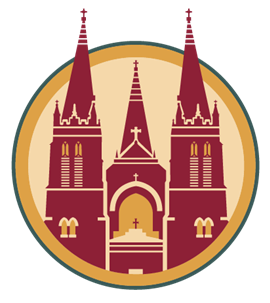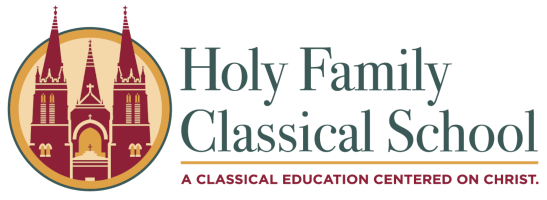CLASSICAL EDUCATION
Classical and Catholic
For centuries classicism has been the norm, not the exception, in Catholic education. St. Augustine, St. Thomas Aquinas, St. Ignatius of Loyola, St. John Henry Cardinal Newman—each was classically educated, as was Holy Family’s own foundress, St. Katharine Drexel. So profound has been the influence of classical learning upon the Catholic tradition that the Congregation for Catholic Education itself refers to classical philosophy as the “perennial philosophical inheritance” of the Catholic Church. Returning to classical curriculum therefore goes hand in hand with revitalizing Catholic mission and identity.
Why classical?
So, why does classical philosophy hold pride of place in Catholic education? As Pope Benedict XVI has observed, the culture of classical antiquity effectively laid the groundwork for the spread of Christianity in accord with God’s providential plan. The ancient notion that a stranger might very well be “a god in hiding”—xenía—led the Greeks to treat all guests as though they were gods in disguise. When these same Greeks encountered the preaching of Our Lord in Mt 25 handed on via the Apostles—“whatsoever you did unto the least of my brethren you did unto me”—the Word of God fell upon fruitful soil, a culture that was especially well prepared for the fullness of Revelation. The Word of God itself in the Septuagint, in the wisdom books, and in the New Testament bears the imprint of classicism in its very language, Greek. Pauline preaching was likewise strongly influenced by Greek learning. The adoption of Christianity as the official religion of the Roman Empire in 325 accelerated a process of cultural synthesis which melded Jewish with Greek and Latin learning. The translation of Scripture into Latin in St. Jerome’s Vulgate further opened Christianity to Latin influence in the early Church. In fact, the Church’s administrative structure is based on the subdivision of the Roman Empire in late antiquity into “diocesan” provinces. When we return to the sources of our rich traditions as Catholics and as Westerners, we find there the rich wellsprings of Hebrew, Greek, and Latin languages, literatures, customs, and learning.
So, what happened?
That’s a great question. In short, the 19th and 20th centuries brought with them a series of overhauls in how people thought about education. Freud and Darwin left aside Aristotle and Augustine for a new concept of human nature. Virtue and vice were abandoned for a new genealogy of morals. Schools were turned into “social experiments” by John Dewey. The classical philosophical view of how we come to know truth and goodness became shrouded in postmodern radical skepticism—the rebirth of the very same ancient errors which were first fought and defeated by Socrates, Plato, and Aristotle.
Ancient skepticism had held three basic doubts about the world around us: first, its adherents argued that there is no truth; second that, even if there were such a thing as truth, it could not be found; and third, that even if the truth existed and could be found, language could in no way communicate it. Altogether, these philosophical doubts led naturally to a denial of the ultimate meaning of things, and of existence itself. In a meaningless world, there is no right or wrong; there are only shades of grey, and pleasures.
But that’s all in the past, right?
Sadly, no. Very few schools today are even aware of the ways in which the prejudices of secularism have infiltrated their ways of thinking about students, teachers, and learning. Most schools set aside Western culture’s best and most ancient learning, and many even militate against Christianity.
The Antidote
Every venom needs an antivenom or else the patient will suffer the worst. Reviving what has been left for dead in education requires an intentional community singularly committed to restoring all things in Christ. This process of renewal asks of us a very simple initial declaration: that the truth is out there, and so too are goodness and beauty; that these can be found, and that they can be taught. This much was held by Socrates, Plato, and Aristotle. These ancient philosophers also taught that the person is a body-soul unity with a discoverable essence revealed in part by our biology. The three basic parts of the person are reason, will, and emotion, and these are subjects and objects of all learning. Such presuppositions are in fact the precondition of all science, ancient or modern.
As followers of Christ, we are able to proclaim even more: that the truth is a person, that the person of Truth is Jesus Christ. In Truth alone will learning set us free. In Christ alone will we find truly liberal, truly freeing learning.
820 South Boulder Avenue | Tulsa, Oklahoma | 74119
Diocese of Tulsa and Eastern Oklahoma | All Rights Reserved | by LPi

